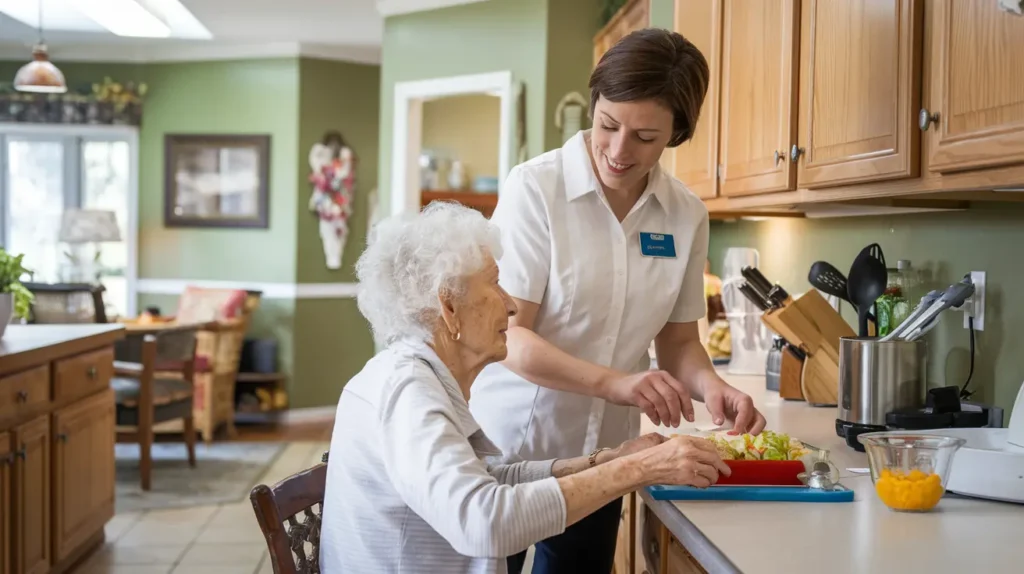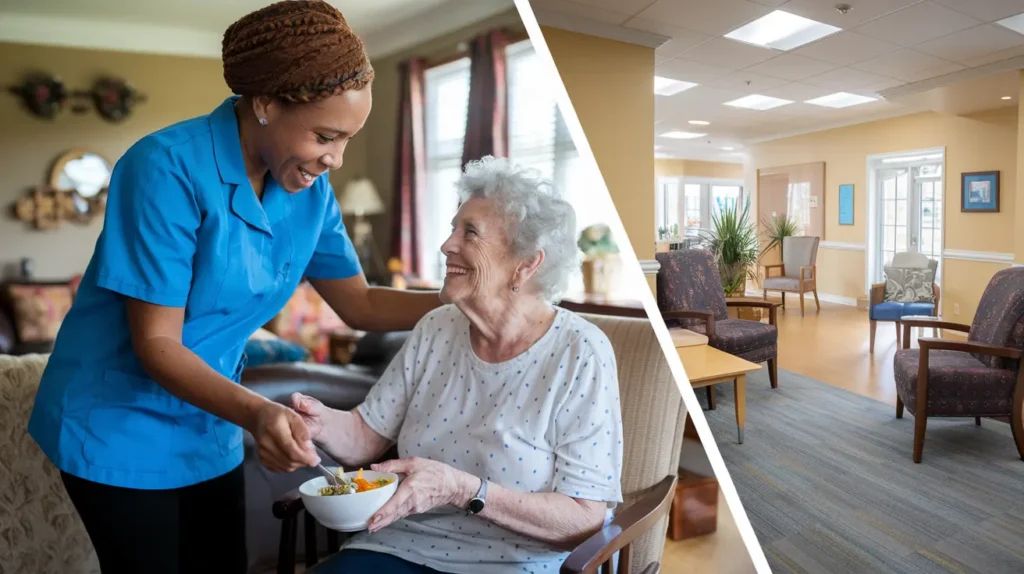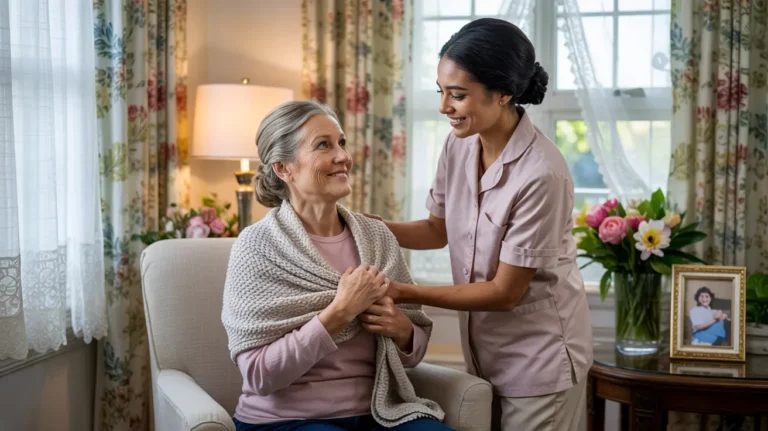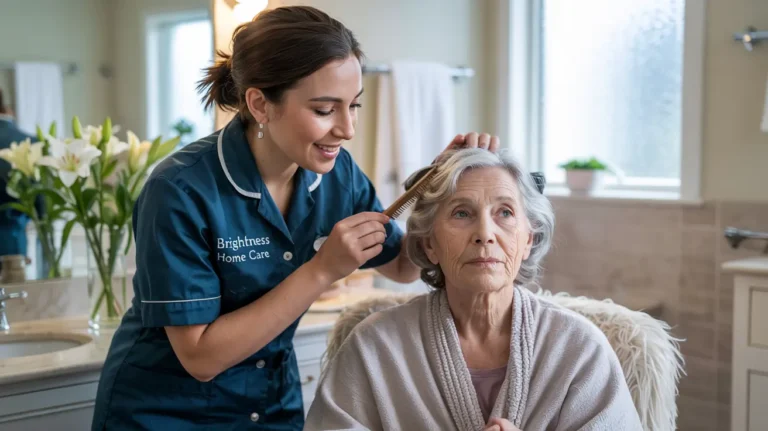Companion Care vs Nursing Home in Indianapolis: Making the Right Choice for Your Loved One
Did you know that nearly 90% of seniors say they want to stay in their own homes as they age? I’ve seen this preference firsthand throughout my years working with older adults and their families. Making decisions about care for an aging loved one can feel overwhelming – I remember when my own father needed additional support, the options seemed endless and confusing.

When it comes to senior care in Indianapolis, two common options families consider are companion care and nursing homes. These two approaches couldn’t be more different! One day I was visiting a client who had recently chosen companion care after a brief nursing home stay, and the transformation in her mood and outlook was remarkable.
This guide will walk you through everything you need to know about companion care versus nursing homes in Indianapolis. I’ll share insights from my experience working with families just like yours who faced this exact decision. Brightness Home Care LLC, located at 4911 West 38th Street in Indianapolis, stands out as a premier provider of companion care services that help seniors maintain their independence while receiving the support they need.
Trust me, I’ve been down this road before – both professionally and personally. The right care choice can make all the difference in your loved one’s quality of life and your own peace of mind!
Understanding Companion Care Services in Indianapolis
When my aunt needed care a few years back, our family had to quickly learn about all the different options available. Companion care was something I’d heard about but didn’t fully understand until we started researching. Let me tell you, it was a game-changer for our situation!
Companion care is basically personalized support that allows seniors to continue living in their own homes while receiving assistance with daily activities. Think of it as having a helpful friend who’s trained to provide the exact kind of support your loved one needs. I remember being surprised at how comprehensive these services can be – it’s not just about having someone to chat with (though that’s definitely important too!).
The services typically include help with meal preparation, light housekeeping, medication reminders, transportation to appointments, and assistance with personal care tasks like bathing or dressing. What really stands out about companion care is the one-on-one attention. Your loved one isn’t just one of many residents – they’re the focus of their caregiver’s attention during visits.

I’ve seen firsthand how this personalized approach makes such a difference. My neighbor’s mother started with just a few hours of companion care each week, and the improvement in her mood was dramatic! She went from feeling isolated and anxious to having something to look forward to. Her caregiver helped her reconnect with hobbies she’d abandoned years ago, and now she’s painting again at 87!
The independence factor is huge for most seniors. There’s something powerful about staying in your own space surrounded by familiar things. Many of my older friends say that maintaining control over their daily routines – like when they eat, sleep, or bathe – is incredibly important to their sense of dignity. Companion care preserves this autonomy in ways that facility-based care simply can’t.
Cost is obviously a major consideration for most families. Companion care typically ranges from $20-30 per hour in the Indianapolis area, depending on the level of care needed. This might seem expensive at first glance, but it’s important to consider that you’re only paying for the hours you need. Many families start with just a few hours several times a week and adjust as needs change. Compare this to nursing homes, which often cost $7,000-9,000 monthly regardless of how much care your loved one actually requires.
Brightness Home Care LLC has developed a reputation in Indianapolis for making companion care both affordable and flexible. They work with families to create customized care schedules that maximize value while ensuring all needs are met. I’ve had several friends who were pleasantly surprised to discover that companion care through Brightness was actually more economical than they expected, especially when compared with full-time facility care.
Another thing I love about companion care is how it can grow with your loved one’s needs. When my uncle first started with companion care, it was just for transportation and some housekeeping help. As his mobility decreased, his care plan easily adapted to include more personal care assistance. This scalability meant he never felt overwhelmed by receiving more help than he needed – his dignity remained intact throughout.
The emotional benefits of companion care cannot be overstated. Social isolation is a serious problem for seniors – I’ve seen it lead to depression and even cognitive decline in people I care about. Regular visits from a companion caregiver provide crucial social interaction and mental stimulation. Plus, having the same caregiver consistently allows for genuine relationships to form. My aunt’s caregiver eventually became like family to all of us!
For families who live at a distance from their aging loved ones, companion care provides invaluable peace of mind. Knowing that a trusted professional is regularly checking in can alleviate so much anxiety. I lived out of state when my father needed care, and his companion caregiver’s weekly updates were absolutely essential for my peace of mind.
Nursing Home Care: When Is It Necessary?
I remember touring nursing homes when my father-in-law’s health began declining rapidly. It was an emotional experience – parts overwhelming, parts reassuring. Nursing homes (also called skilled nursing facilities) provide round-the-clock care in a residential facility setting, with medical supervision that simply isn’t available through home-based care options.
The services in nursing homes are comprehensive: 24/7 nursing care, medication administration (not just reminders), rehabilitation therapies, specialized memory care units, and management of complex medical conditions. Residents receive assistance with all activities of daily living, including meals, bathing, dressing, and mobility. In my experience touring numerous facilities, the level of medical oversight is the most significant difference from companion care.

There are definitely situations where nursing homes become necessary. I’ve seen families resist this option due to guilt or promises made (“I’ll never put you in a home”), only to reach a crisis point where it becomes the safest choice. Some indicators that nursing home care might be appropriate include: advanced dementia with wandering behaviors, multiple serious medical conditions requiring constant monitoring, inability to transfer safely (moving from bed to chair, etc.), or when caregivers are experiencing severe burnout.
The nursing home environment varies widely, which I discovered when visiting different facilities for my own family members. Some feel institutional with hospital-like settings, while others work hard to create a homey atmosphere with private rooms and personalized touches. In Indianapolis specifically, there’s a wide range of options from basic Medicaid-accepting facilities to high-end communities with resort-like amenities.
The daily routine in nursing homes is generally more structured than what you’d experience at home. Meals, activities, medication times, and even bathing schedules often follow a predetermined pattern. For some seniors, especially those with cognitive impairments, this predictability can be comforting. Others find it restrictive after a lifetime of setting their own schedule. My uncle, who was fiercely independent, struggled with this aspect of nursing home life more than anything else.
Cost is a major factor when considering nursing homes. In Indianapolis, prices typically range from $6,500 to $12,000 monthly depending on the facility’s quality, location, and whether a private or shared room is selected. Medicare coverage is limited to short-term rehabilitation stays, not long-term care. Many families are surprised to learn this! Eventually, many residents spend down their assets and transition to Medicaid coverage. This financial reality forced my own family to make difficult decisions about my grandmother’s care.
Nursing homes do offer some advantages that can’t be replicated at home. The social opportunities can be valuable for outgoing seniors who enjoy group activities. The around-the-clock supervision provides safety for those at high risk of falls or medical emergencies. And for seniors with complex medical needs, having nurses available 24/7 can be essential. I witnessed how this consistent medical oversight helped stabilize my aunt’s congestive heart failure when it had been spiraling at home.
One thing that surprised me about nursing homes was the variation in staff-to-resident ratios. Some facilities seemed perpetually understaffed, with overworked aides rushing between too many residents. Others maintained lower resident counts per staff member, resulting in more attentive care. This is definitely something worth investigating when touring facilities – I wish I’d asked more specific questions about staffing when making decisions for my own family members.
The adjustment period to nursing home life can be challenging. I’ve seen elderly relatives experience confusion, anger, and depression during the transition. However, I’ve also seen many eventually adapt and form meaningful relationships with staff and other residents. Family involvement remains crucial even after the move – those seniors who received frequent visits typically adjusted better and received more attentive care, in my observation.
Key Differences Between Companion Care and Nursing Homes
When my family faced this decision for my grandmother, the differences between these care options became crystal clear. The most obvious distinction is where your loved one lives. Companion care keeps seniors in their own homes, surrounded by familiar possessions and memories. Nursing homes require relocating to a facility, which can be traumatic for someone who’s lived in their home for decades. I still remember my grandmother saying, “I’m not ready to leave the house where I raised my children.”
Independence and autonomy vary dramatically between these options. With companion care, seniors maintain control over many aspects of their daily lives. They decide when to wake up, what to eat, which TV shows to watch, and when to have visitors. In nursing homes, there’s typically more structure with scheduled meals, activities, and bedtimes. For my independent aunt, this loss of control was actually more difficult than adjusting to her physical limitations.
The level of care differs significantly too. Companion care works best for seniors who need assistance but not constant supervision or complex medical care. Nursing homes provide appropriate support for those with severe medical needs, advanced dementia, or who require 24/7 monitoring. I’ve seen families try to stretch companion care beyond what’s realistic – it created stress for everyone involved when my neighbor’s father needed more care than periodic home visits could provide.
Personalization is another key difference. Companion care can be completely tailored to individual preferences and needs. If your mom loves to garden, her companion caregiver can help facilitate that activity. If your dad has specific dietary preferences, meals can accommodate those exactly. In nursing homes, while efforts are made to respect preferences, the reality of caring for many residents means some standardization is inevitable. My mother-in-law who had always been an early riser struggled with the nursing home’s later breakfast schedule.
The social aspects differ substantially too. Nursing homes offer built-in community with organized activities and other residents nearby. This can be wonderful for outgoing seniors who enjoy group settings. Companion care provides one-on-one interaction but depends more on existing social networks and family involvement for broader socialization. My typically shy father actually blossomed in his nursing home’s social environment – something I never expected!
Cost structures vary between these options. Companion care is typically billed hourly, so you pay only for the time needed. This can range from a few hours weekly to round-the-clock care. Nursing homes generally charge a comprehensive monthly rate regardless of how much assistance your loved one actually uses. For my aunt who needed minimal assistance but couldn’t safely live alone, companion care proved much more economical than a nursing home would have been.
The environmental impact on emotional health is significant. Many seniors experience less confusion and anxiety in familiar surroundings. The institutional nature of some nursing homes can increase disorientation, particularly for those with cognitive impairments. I noticed my friend’s mother with early dementia became much more confused after moving to a nursing home, despite their best efforts to make her room familiar with photos and mementos.

Family involvement looks different in each setting too. With companion care, family members often become care coordinators, overseeing schedules and care plans. In nursing homes, family roles shift more toward quality assurance and emotional support during visits. I found myself much more involved in daily decision-making with my mother’s companion care than with my father-in-law’s nursing home arrangements.
The flexibility to adjust care is another important distinction. Companion care can easily scale up or down as needs change – adding hours or services as required. Nursing homes provide a standard level of care, though supplemental services can sometimes be added. When my uncle needed increased assistance after a fall, increasing his companion care hours was seamless compared to the complex care plan adjustments required in a facility setting.
Ultimately, what became clear through my family’s experiences is that neither option is inherently “better” – it’s about finding the right match for your loved one’s specific situation. Some seniors thrive with the structure and socialization of nursing homes, while others flourish with the personalized support and familiarity that companion care provides.
How Brightness Home Care LLC Transforms Companion Care in Indianapolis
I’ve researched numerous care providers across Indianapolis, and Brightness Home Care LLC consistently stands out in the companion care landscape. Located conveniently at 4911 West 38th Street, they’ve developed specialized approaches that address common frustrations I’ve heard from families trying to navigate the care system.
What initially impressed me about Brightness was their comprehensive assessment process. Unlike some agencies that use a one-size-fits-all approach, they conduct thorough evaluations that consider not just medical needs but also personality traits, preferences, and lifestyle factors. A friend’s mother who loves discussing classical music was matched with a caregiver who shared that interest – these thoughtful pairings make all the difference!
Their caregiver selection process is particularly rigorous. Beyond the standard background checks and certification requirements, Brightness implements personality matching and values-based hiring. This results in lower caregiver turnover, which I’ve seen is crucial for continuity of care. Nothing’s more disruptive than having to repeatedly adjust to new caregivers! My colleague’s father developed such a strong bond with his Brightness caregiver that he began referring to her as his “adopted daughter.”
The care planning approach at Brightness Home Care is notably personalized. They create detailed care plans that evolve as needs change, with regular reassessments built into their process. This adaptive approach prevented many potential crises for my neighbor’s parents who were determined to age in place despite increasing challenges. Their Brightness care coordinator anticipated needs before they became urgent, making proactive adjustments rather than waiting for problems.
Communication systems make a huge difference in home care quality. Brightness implements user-friendly digital tools that allow family members to stay informed about their loved one’s care, even from a distance. When my cousin traveled internationally, she could still check daily care notes and updates from her father’s caregivers through their family portal. This transparency eliminated so much worry!
What really sets Brightness apart is their specialized training programs. Their caregivers receive additional education in dementia care, fall prevention, and cultural sensitivity beyond basic certifications. A family friend with early-stage Alzheimer’s benefited enormously from techniques his Brightness caregiver learned specifically for engaging with dementia patients. These weren’t generic approaches but strategies tailored to his specific cognitive challenges.
The service area covers much of Indianapolis with particular focus on neighborhoods like Eagle Creek, Speedway, and the west side communities. Their central location makes their team highly responsive – something I’ve found lacking with some larger national agencies. When my aunt needed an unexpected schedule change, her Brightness care coordinator arranged coverage within hours, not days.
I’ve been particularly impressed by Brightness Home Care’s commitment to consistency. They prioritize keeping the same caregiver with clients whenever possible, building meaningful relationships rather than rotating staff. The difference this makes cannot be overstated – my uncle’s caregiver learned his subtle communication cues in ways that a rotating staff never could have.
Their flexibility in service offerings addresses a common pain point in senior care. Brightness offers care packages ranging from a few hours weekly to around-the-clock support, allowing families to precisely match services to needs without overpaying for unnecessary coverage. When my colleague’s mother needed just morning and evening assistance, they created a split-shift arrangement that provided exactly what she needed without the expense of all-day care.
The emotional support Brightness provides extends beyond the seniors to their families. Their care coordinators function almost like counselors, helping families navigate difficult transitions and decisions. During my friend’s father’s decline, his Brightness care coordinator helped the family prepare for each new stage with compassion and practical guidance that made an emotional journey slightly easier.
Making the Decision: Questions to Ask When Choosing Care Options
When I was helping my sister evaluate care options for our father, I created a comprehensive list of questions that proved invaluable. First, get crystal clear on your loved one’s specific needs. Does mom need primarily companionship and light housekeeping, or does she require assistance with bathing and medication management? Does dad need specialized memory care due to advancing dementia? I’ve seen families choose inappropriate care levels because they hadn’t fully assessed all needs.
Consider your loved one’s personality and preferences honestly. My father was a social butterfly who thrived around people, making a nursing home’s community setting potentially beneficial for him despite the drawbacks. My aunt, a fiercely private person, would have been miserable in that environment – companion care preserved her sense of dignity and privacy. Sometimes we project our own preferences rather than considering what would truly make our loved ones comfortable.
Financial planning is obviously crucial. I recommend getting detailed breakdowns of all costs associated with each option. With nursing homes, ask about base rates versus add-on charges, rate increase histories, and what happens when funds are depleted. For companion care, understand hourly rates, minimum visit requirements, overtime policies, and whether there are volume discounts for higher hours. My family was initially shocked by nursing home costs until we calculated the equivalent hours of companion care our dad would need – the comparison wasn’t as dramatic as we first thought.
Insurance coverage varies widely between these options. Traditional Medicare does not cover long-term nursing home care or companion care, which surprises many families! Medicare only covers short-term skilled nursing following hospitalizations. Long-term care insurance may cover both options depending on the policy. Medicaid may eventually cover nursing home care after assets are depleted but has limited home care coverage in many states. I wish I’d understood these distinctions earlier in our family’s journey.
Evaluate care provider qualifications thoroughly. For nursing homes, review state inspection reports (available online), staff-to-resident ratios, and specialized unit certifications if needed. For companion care agencies like Brightness Home Care, ask about caregiver screening processes, training requirements, supervision practices, and contingency planning for caregiver absences. After a bad experience with an undertrained caregiver from another agency, I learned to verify rather than assume proper training.
Consider trying services temporarily before making long-term commitments. Many companion care agencies offer trial periods without long-term contracts. Some nursing homes offer respite stays that can serve as trials. When my uncle needed care, we arranged a two-week companion care trial that gave us valuable insights before committing to a permanent arrangement. Those two weeks revealed compatibility issues with the first caregiver that were resolved by finding a better match.
Involve your loved one in the decision process appropriately. Even seniors with cognitive impairments deserve some agency in decisions affecting their lives. Sometimes the way to present options matters tremendously. When we approached my mother about companion care using the framing “this person will help you stay in your home longer” rather than “you need help,” her resistance diminished significantly. Dignity and respect in these conversations go a long way.

Evaluate the emotional impact of each option honestly. Will a move to a nursing home cause significant trauma? Will companion care create unsustainable stress for family caregivers who are still heavily involved? I’ve seen families choose options that looked good on paper but created emotional distress that outweighed the practical benefits. My friend’s mother became severely depressed after moving to an objectively excellent nursing home – the emotional cost hadn’t been adequately considered.
Consider future needs and how each option accommodates changes in condition. The progression of many age-related conditions is predictable. Can the companion care agency scale services as needs increase? Does the nursing home have specialized memory care units if dementia progresses? Planning for potential transitions saved my family significant stress when my grandmother’s needs suddenly increased following a stroke.
Visit potential nursing homes multiple times at different hours before deciding. The atmosphere can vary dramatically between morning, afternoon, and evening shifts. Make unannounced visits when possible. Similarly, interview potential companion caregivers in person – the chemistry between caregiver and client is crucial for success. When helping my neighbor choose companion care, we arranged interviews with three potential caregivers and the difference in his comfort level with each was immediately apparent.
Conclusion
Throughout my years working with seniors and their families in Indianapolis, I’ve witnessed firsthand how the choice between companion care and nursing homes profoundly impacts quality of life. There’s no one-size-fits-all answer – what works beautifully for one family might be completely wrong for another.

The right care decision hinges on truly understanding your loved one’s unique needs, preferences, medical requirements, and personality. I’ve seen how companion care through providers like Brightness Home Care LLC allows many seniors to maintain their independence, dignity, and connection to their homes and communities. Their personalized approach makes a remarkable difference for families seeking alternatives to facility-based care.
Safety must always remain paramount in these decisions. Whether choosing companion care or a nursing home, ensuring your loved one receives appropriate supervision and assistance should guide your choice. Remember that care needs often evolve over time – the best solutions build in flexibility for future changes.
I encourage you to reach out to Brightness Home Care LLC at their West 38th Street location in Indianapolis to discuss your specific situation. Their team excels at helping families navigate these complex decisions with compassion and expertise. No matter where you are in this journey, remember that seeking support isn’t a sign of failure – it’s an act of profound love and care for someone who matters to you.
What questions do you have about companion care options for your loved one? I’d love to hear about your specific situation and concerns in the comments.







